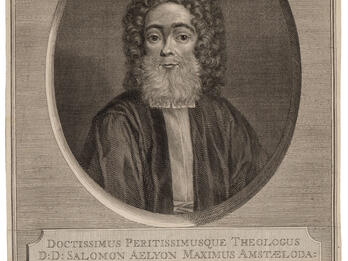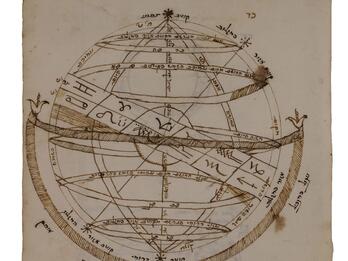Amude shesh (Marble Pillars)
And with this ethical teaching I saw fit to seal up the pillar of Torah, which in our generation is very much weakened, and on the verge of the abyss, as all its methods of study are corrupt from the day a person becomes aware of himself until he grows old. For before a child knows to abominate evil and choose good (Isaiah 7:15), he is given over to a tutor to teach him to read a few verses about [the Torah portion of] Genesis, and the next week a few verses about Noah, and so on with all [the weekly Torah portions]. He is taught nothing but the meaning of the words, not the meaning of the verses in context, and even if the tutor learns the entire portion with him, in any event he will not teach him the connection between its topics. After that he will begin to study Mishnah or Gemara, even though he is still ignorant about the unity of God and the acceptance of the yoke of the fear of God and His commandments. Thus, he does not know the love of God or the awe of God or the commandments of God. Why, then, should he teach him Mishnah or Gemara, since all his studies so far done have left him with nothing? Despite all the Bible he has learned, there is nothing of the study of Torah in it, but merely the study of the language alone, in that he has learned to speak in the Holy Tongue, as all he can remember is the meaning of the words. He could have taught him the Holy Tongue without recourse to any book, in the manner that a person is taught the other foreign languages. I wonder how they can call the study of the language alone the study of Torah. Is this the Torah? [ . . . ]
The proper order is to teach them the Bible first, while explaining the link between the meaning of the words, from the beginning to the very end, not the manner that they teach it in our day. . . . Once he has learned the whole Bible and understands the commandments of God, then he should be taught sections of the Mishnah, first those that are practiced in these generations, followed by the Order of Kodashim [Consecrated Offerings] and ritual contamination and purity. . . . After he has been taught all this, he can also study the Talmud, and if he is not capable of this, he should instead be taught the twenty-four books [of the Bible]. Each and every day he should receive guidance in ethics and the fear of God all day long, not in the manner of tutors in this generation. For they all care only about their salaries, and they are merely interested in finishing the allotted amount every day, one hour a day. They do not bother teaching either the fear of heaven or ethics or good morals. Consequently, most of the boys, when they go out free to their homes, the earth shakes at the sound of them, as they do not honor old people, and also there is no respect among themselves, they only dance around like young calves in the streets of the city in an uncultured and rude fashion. Accordingly, habit has become nature in some of them, and thus even when they grow up, they become defiers and despisers (Ezekiel 2:6), rebelling against their teachers and refusing to honor their elders. For they never learned otherwise from their teachers in their youth, as their teacher cared only about his wages. This is a blow to us whose effects cannot easily be mitigated, and yet its cause is unnoticed by most of our people. They see this and are amazed (Psalms 48:6): Why is this found more among Jewish boys than all the other nations? But the truth is that this is all due to the sin of their tutor, in addition to the fact that most fathers spoil their sons from their youth, sparing the rod, in reliance upon his tutor, while the tutor neglects the fundamentals entirely. On the contrary, he deceives the father as well through flattery, by praising him with comments such as, “This boy will be a great Torah scholar,” so that he will be hired as a tutor. When the boy is suited only for the study of halakhah, he tells him that he is worthy of studying Tosafot [advanced commentaries on the Talmud], and he rushes to shove an elephant through the eye of a needle. Naturally, the father is pleased to hear this, and he skips with him over the mountains and hills to teach him great things that are too complex for him. Ultimately, the child is left empty of everything and has gathered only wind in his hands, and everything that he has learned came up in a night and perished in a night [see Jonah 4:10].
I examined the matter again and saw [see Ecclesiastes 9:11] the great benefit that comes from the study of the Mishnah that was established by the Maharal of blessed memory, here in the holy community of Prague, in all the synagogues, that people should study a chapter in pairs after the prayers. The reward for this practice is very great, and it confers great benefits, as even householders who are not clever enough to study halakhah every day, and also some of them who have no free time, can at least study a chapter of Mishnah every day. Therefore, I, too, wish to affirm this custom decisively, with my full authority and power, especially now upon the publication of the commentary Tosafot Yom Tov [by Yom Tov Lipmann Heller] on the Mishnah, which is a sufficient aid for anyone who reads them. Therefore, every God-fearing man should take it upon himself to study Mishnah, and likewise in every city and holy congregation, to where the commandment of the King the Lord of Hosts reaches [see Esther 4:3], they should recount the righteous acts of the Lord there [see Judges 5:11] and inaugurate this custom, as it is very important. With regard to the order of study for boys as well, I have already written that the main study immediately after the Bible should be the Mishnah, and that no God-fearing man who wants to teach his son what is best for him and what will provide him with the most benefit later on in life should begin to study Gemara with him until the boy knows and has studied at least the orders of Mishnah that are observed in our day. [ . . . ]
I have a running dispute with the great sages of this generation, as I wish to abolish the study of analytics and pilpul [critical dialectics] that is called ḥiluk [analysis], because in my opinion, anyone who distorts what is known to be correct belongs in the category of he has despised the word of the Lord (Numbers 15:31). However, I was unable to defeat them. There are two reasons for this. Those who pursue an excess of honor and authority and who desire, each of them, to be seated among the wise leaders [see Rashi on 2 Samuel 23:8] say casuistry is the unique quality that distinguishes us from others. They also argue, based on evidence, that everything in the whole Torah is improved by sharp reasoning. But the truth is otherwise, for we ourselves can see that in those places where they do not learn this deceitful pilpul, such as in the land of Israel and in other gentile lands, they are knowledgeable in all branches of wisdom and all the rabbinic authorities, since they have more free time, and they do not spend their days over most of the year in the pursuit of vanity, as they do in these countries. Especially young men, we see clearly that this analysis causes them great ruin, because anyone who is unable to cope with this vanity is regarded as a nobody and is forced to cease his studies. However, if the essence of study were Bible and Mishnah and Talmud and the rabbinic authorities, he too would be like one of them. Those who run the yeshivot do all this for their own honor, for the glory of the king is in the multitude of people (Proverbs 14:28), and the youths gather to them. Thus, there is more waste matter than food, and it is gathered up in piles and piles [see Exodus 8:10], and while some are silent, others cackle.
Credits
Published in: The Posen Library of Jewish Culture and Civilization, vol. 5.





